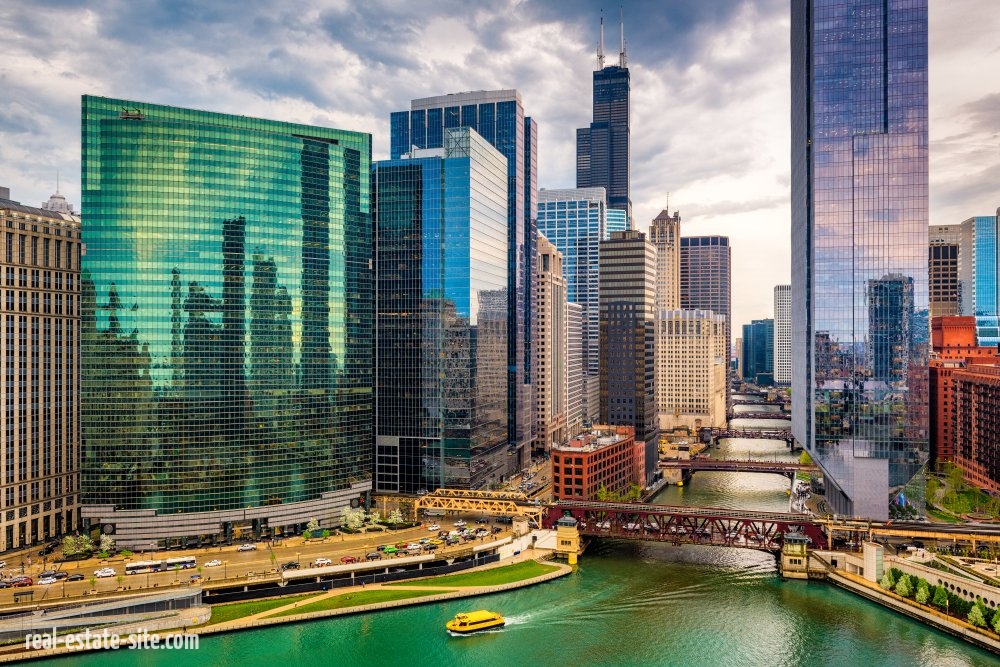Chicago, known as the “Windy City,” is one of the most vibrant and diverse cities in the United States. With its rich history, cultural diversity, and dynamic economy, Chicago has become a prime destination for real estate investment. The city’s real estate market offers a unique blend of opportunities and challenges, making it an intriguing subject for potential homeowners, investors, and developers. This article provides an in-depth look at the real estate market in Chicago, exploring its various neighborhoods, trends, and factors influencing property values.
The Chicago Real Estate Market Landscape
Chicago’s real estate market is characterized by its diverse range of properties, from historic brownstones and greystones to modern high-rise condominiums and luxury apartments. The city’s architectural diversity is one of its most appealing features, offering something for every taste and budget. Chicago’s neighborhoods, each with its own distinct personality and charm, play a significant role in the real estate market.
Key Neighborhoods and Their Appeal
Chicago is home to numerous neighborhoods, each offering a unique living experience. The Loop, the city’s central business district, is a hub of activity with its towering skyscrapers and bustling streets. It’s an ideal location for professionals working in the city’s financial and business sectors. The Near North Side, including the famous Magnificent Mile, offers upscale living with luxury condos, high-end shopping, and fine dining. It’s a preferred choice for those seeking a cosmopolitan lifestyle.
Lincoln Park, known for its green spaces and family-friendly atmosphere, attracts families and young professionals alike. The neighborhood’s proximity to Lake Michigan and the Lincoln Park Zoo makes it a desirable location. Lakeview, with its vibrant nightlife and diverse community, appeals to young adults and those looking for a lively urban environment.
Wicker Park and Bucktown, once industrial areas, have transformed into trendy neighborhoods with a thriving arts scene and eclectic boutiques. These areas attract creative professionals and those seeking a bohemian lifestyle. The South Loop, another rapidly developing area, offers a mix of historic lofts and new construction, catering to a diverse demographic.
Market Trends and Property Values
The Chicago real estate market has seen significant fluctuations over the years, influenced by economic conditions, interest rates, and demographic shifts. In recent years, the market has shown resilience and growth, driven by a strong local economy and a resurgence in urban living. Property values in Chicago vary widely depending on the neighborhood, property type, and market conditions.
In prime areas like the Near North Side and Lincoln Park, property values have remained robust, with high demand for luxury condos and single-family homes. The West Loop and South Loop have also experienced substantial growth, with new developments and increased interest from both buyers and renters. These areas offer a mix of residential and commercial properties, attracting a diverse population.
However, some neighborhoods have faced challenges, particularly those on the city’s South and West Sides. These areas have historically struggled with economic disparities and higher crime rates, affecting property values and investment potential. Efforts to revitalize these neighborhoods through community development initiatives and public-private partnerships are ongoing, with the aim of creating more equitable opportunities for residents and investors.
Factors Influencing the Market
Several factors influence the real estate market in Chicago, including economic conditions, population growth, and government policies. The city’s economy, driven by finance, technology, healthcare, and manufacturing sectors, plays a crucial role in the real estate market’s health. Job growth and economic stability attract new residents and support property demand.
Population trends also impact the market. Chicago’s population has been relatively stable, with some fluctuations due to migration patterns and demographic changes. The city’s diverse population, including young professionals, families, and retirees, creates varied housing needs and opportunities.
Government policies, such as property taxes, zoning regulations, and development incentives, significantly affect the real estate market. Property taxes in Chicago are among the highest in the country, influencing affordability and investment decisions. Zoning regulations determine the types of properties that can be developed in specific areas, impacting neighborhood character and growth potential. Development incentives, such as tax abatements and grants, encourage investment in underdeveloped areas and support urban renewal projects.
The Future of Real Estate in Chicago
The future of Chicago’s real estate market looks promising, with ongoing developments and investments aimed at enhancing the city’s livability and attractiveness. Infrastructure projects, such as the expansion of public transportation and improvements to roadways and green spaces, contribute to the city’s appeal and accessibility. These projects are expected to boost property values and attract new residents and businesses.
Sustainable development is another emerging trend in Chicago’s real estate market. Developers are increasingly focusing on eco-friendly building practices and energy-efficient designs, responding to growing demand for sustainable living. Green buildings and communities are becoming more popular, reflecting broader environmental awareness and a commitment to reducing the city’s carbon footprint.
Technology is also playing a significant role in shaping the future of real estate in Chicago. The rise of smart homes, equipped with advanced technology for security, energy management, and connectivity, is transforming the way people live. These innovations enhance convenience and quality of life, making properties more desirable.
Chicago’s real estate market offers a dynamic and multifaceted landscape, with opportunities and challenges for buyers, investors, and developers. The city’s diverse neighborhoods, each with its unique character and appeal, provide a wide range of housing options and investment potential. Market trends, influenced by economic conditions, population growth, and government policies, shape the real estate landscape and determine property values.
As Chicago continues to evolve, with ongoing developments and a focus on sustainability and technology, the real estate market is poised for growth and transformation. Whether you’re looking for a historic home in a charming neighborhood, a luxury condo in a bustling urban center, or an investment property with growth potential, Chicago has something to offer. Understanding the intricacies of the market and staying informed about trends and developments is key to making informed real estate decisions in this vibrant city.

